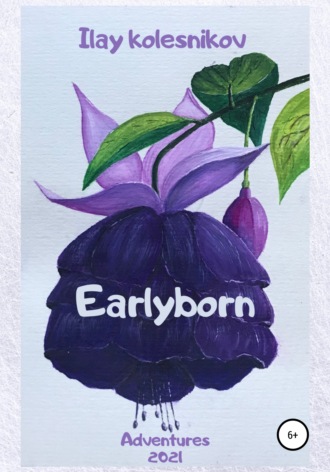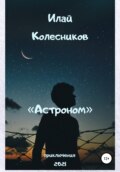
Илай Колесников
Earlyborn
Chapter 14, Alkaid
Any toy is okay that keeps the baby at play. (Russian saying)
Let the nature-child play with anything, but look after it, so that it would not make the weather bad. As they approached to Bermuda, they had a baggage of memory seen the colossal number of storms, and it seemed no one had got in so many of them before. Our siblings placed the new Range Rover (it was not clear whether it was defective) on the deck of the weather-beaten ferry, but they drove from the ship on a rough, tanned and a bit dirty jeep-discoverer. The Islands of Bermuda at the same time are famous and not for its surroundings. I guess, it is the last place people think about when choosing calm and comfortable rest. But Earlyborn and her brother did not think this way. They chose adventures—to reach Antarctic, so they could not back out from their journey, like a person who made his mind on staying awaken for the whole night looks in disdain at a strong desire to close his eyes at 9 p. m.. There was something worth seeing on Bermuda. To be honest, Earlyborn and Zhenka did not know about it, so, probably, that was the reason for them to be fearless and enthusiastic to arrive there by ferry. There were many curiosities. What can you say about tame sharks near the pier? They belonged to a smart local boy, and their meaning was merely to amaze arriving people with the colour of the area! Yes. It was so. Unexpected and simple.
It seemed the elements were furious above the Atlantic. A tiny crab, which came at the white sandy beach now to explore the world, became too worried from what he saw and would see so that it close its face with claws under emotions. Earlyborn and Zhenka looked like this crab very much when they saw each other sunburned. They left their car at the harbor parking as a thing which they would need, but not at the very moment, and now sat at the ocean shore after the storm and looked at the west, talking and thinking simultaneously about their own ideas. Irkutsk was left somewhere behind with its frosty tangerine winters, glamorous Paris that, seemed, smacked his lips with each wind gust was also left somewhere behind—anything that could restrain a free person from enjoying the life was left far from the Islands of Bermuda.
***
They were confident in the day of tomorrow and were not confident in the past days. They conjectured now how their journey would continue. According to the main rule of life, an uplift comes after a stagnation, which means our characters did not have to bother about it themselves. Earlyborn and Zhenka had gone far from the old problems and could think sensibly. They could draw their plans on the sand, frighten and caress the already scared crab, pretend they were parrots and swim from time to time. It happens throughout life: if you would like to lose something, try to love. If you want to be fit, do exercises. Perhaps, this is so, since only sufferings help us to excel and improve ourselves. An artist who is full up is believed to be a bad artist. It turns, then, that the serfdom gave us the prosperity. Arguably, this process in Russia took us more time than people in other countries, yet it was vast, and now we are tought that it is better to do everything just by plan and do not do anything beyond it.
The sky was darkening. Yet it was not the sunset suddenly fallen on the ground – it was the next storm. Earlyborn stopped being afraid of it since she overcame her strongest fear: to see the globe lightning. The siblings sweetly chatted about something. If I am not mistaken, Zhenka said that he did not manage to examine his heart in Irkutsk, because one doctor went on holiday, and another doctor became ill. This topic was chosen accidentally, but the sister abruptly began to worry about brother’s health. “Never mind, sister. Remember as Pushkin expressed with the words of his character Emelian Pugachev?7 It is not a good idea to eat carrion for three hundred years. It is better to live for twenty, thirty years freely.” And so spoke Zhenka, “Sister, do not think about doctors, as my heart does not hurt now, which means everything is alright, and we are well too. Furthermore, we do not have medical records neither at the university hospital, nor at the psychiatric one. I prefer not to know about my illnesses for fifteen years, than to go to hospitals each of my twenty years. This is the truth. There haven’t been any wild animal that could have win the human being in patience when was at bay. And men are helpless to change the nature’s will. If something is needed, it must be given. Cows make way for each other in herd when they go to a water trough, although they go in rows.”
Earlyborn was disappointed when looked at Zhenka’s contemptuous attitude towards his health. But she understood him, for she was a young woman. She, herself, often lying in a bath with soapsuds, exaggerated her disease and instilled the feeling she would die tomorrow. This disease is faith. Hope springs eternal. The sunrise must not die. And Earlyborn (as you remember, she got her name, since she was borne at the crack of dawn) seemed to reborn every day. Sad thoughts came to her mind almost every evening, but as the morning came, she kept them away in attempt to start the new life and merely be happy, looking at the sun. Faith does not let an ill person die, and only the lack of belief make people die. Belief in your strength to withstand life in the battle for the youth and territory. Belief in your abilities to change this world gives you the reason to live. Accidents are the God’s will. “How many ships did sink while last storm spread to Bermuda and the northern part of the Atlantic,” Zhenka thought, rubbing one sharp pebble stone with another. It was stunning to gaze at life powder that spattered the ground after this process. If we speculate properly, we will find out that anything, even diamonds, gold, appeared from one molecule or from the simple Big Bang. Then we can call ourselves dust. And the dust—our brother. Zhenka called in mind memories of his childhood, when he skipped extra drawing lessons, to which his mother took him nearly under pressure, so that he did not spend much time playing with the rabble and running to the Lake. Zhenka did not appreciate these efforts. Years went by. His mother, who learned him so much good and brought him up as an individual, passed away; that rabble also passed away, once fallen under the ice in the Lake in winter. All of a sudden, Zhenka discovered the love to drawing in himself. Although he did not have a gift for this, he continued making and polishing sketches of one thing. It was a small lily and his mother’s darling face that he brought through his childhood. She often came with this lily in her threads in summer, as some people come with a bunch of chamomiles from the field. She told Zhenka the lily was a symbol of her life to him. Everyone on the market was baffled about the purpose of the lily she purchased every day, yet she knew there was beauty in it. Recently Zhenka started drawing a different portrait of the mother—as if it partly reflected his sister, who was younger than he and did not manage to learn skills and secrets, which we should definitely inherit from our mothers. Zhenka drew Earlyborn with the aloe leaf behind her ear. He wanted to warm her heart doing this, to help her soul feel better, since he saw her health problems and strange examinations she did at the doctor’s. They soon went to bed. As the dawn came down the earth, Zhenka got the clear picture of the aloe leaf. It was literally fragrant on the paper. Earlyborn sniffed its smell, lying on the hammock at the seashore, and smiled, while Zhenka, like a manly soldier, draw her portrait and guarded her sleep.
Chapter 15
When the next morning Zhenka disentangled the hammock after Earlyborn’s night fall on the cold from the night storms sand, he was humming the tune of the unknown origin: it was either the old or the composed impromptu one. How vast is the discrepancy between the thoughts come into the mind of a person at the time different. I do not take into consideration the long timespans. Only the ideas of a person who did sleep enough and the one who did not. Such a condition could be compared to one when you lie on your back at the beach, looking above, in the sky, for some time, and when you lie on your stomach and see nothing but sand for another time. There is quite a difference. As Earlyborn slept well, her glance at the world, Zhenka and the tiny crab had changed now, and it seemed to her they moved to another place. Did she miss her apartment in Paris? You bet! People who do not miss, do not live. A person must always await something. Anticipation is a strong feeling. On Monday a person should anticipate his walks towards home during the weekdays; on Friday—how he would have a good sleep at weekends; at midday—that he would do yoga in the evening. In his childhood, a person may well anticipate driving his own car and going shopping on his own. “Turns scarlet the dusk—December, the blueness with colour of ginger; all have and don’t ask a stranger” These words, probably, appeared in a tiny crab’s head when it came out at the beach and became intoxicated with freedom. It got used to the diversity of life around. There are school teachers and the course of study. They tend to teach us following a defined system with the use of undefined methods. How on earth can studying at school be defined? People are not robots. If you ask me, what the school is for, I would say it is folklore, where nerves are the main characters. I reckon that education make people believe: people feel awkward because they are bored. Then it becomes clear why there are many awkward teenagers today. Everything is simple: now they are frowned and placed into a stuffy classroom instead of sitting by the fire and listening to the flames cracking in November. Yet conditions are same for everyone. We should study just for three reasons: this will help you find your vocation, it will make your mentors and relatives, and, in addition to that, you will be able to earn a living with it. Everyone asks, “And where did the nobility disappear?” On the whole, it did not disappear. We cannot get rid of habits that built our souls at once, as a diver is not able to swim quickly back to the water surface from the depth in two kilometres, even though you will seek for his help. Differences in underwater pressure are huge. Noblemen and peasants are with us. Only relationships between them changed. Now it is named “capitalism”. Zhenka went to drive his new car among the undiscovered areas, keeping it secret from Earlyborn, who went to wash the clothes in bay. Everything had been alright before the crocodiles began to cross the road.
***
Luisian was getting on fine. Passengers in the train did not bother him much, and he found the way pretty well, sitting in the air filled with tea. He changed the train in Brest. It was a Russian long-distance train. Now they passed Smolensk. It was about four o’clock in the morning, and almost entire train slept, although there were some morning larks here, among Russians, who got up ten if not twenty minutes ago. Luisian was still lazing in bed. Getting up was not in his plans, however, he opened his eyes more likely in order not to fall down from the top shelf in the economy class, catch his leg on metal constructions and wake up everyone around. Luisian simply wanted to feel that amazing atmosphere of mystery, which every person, who wakes up at night on the road to another country. There were lakes behind the window. The smell of winter fell on Russia. Even in Brest, changing the train, Luisian discovered that the frost made his nose feel uncomfortable. The temperature was exactly zero degrees Celsius. It was the last day of January, and tomorrow was going to be February. Such weather did not turn to be the maximum for the Russian winter. Luisian lost the hope to see swans and storks he wanted to see during his way from Paris out of the window of the carriage. He also thought that Smolensk is one of the southern towns in Russia. But there were not any swans. January snow spread like a melted bar of chocolate on the surface as wide as the eye can see—for hundreds, thousands kilometres around. Now it was covered with the light of the moon and a myriad of stars, so that it seemed to sparkle with colours of the night rainbow as if the sun was replaced with a sapphire moving back and forth. Obviously, there was no sapphire. A sapphire cannot live for a long time in Russia. The same is to drive the import car in the forest. It makes people worry about the vehicle very much. It will be caught on a tree branch, scratched and filthy. So if a hungry bear does not come out after its hibernation and eat the sapphire, a crow may well take it to its nest, up in the trees. Luisian looked behind the window and saw the forest, towering above constellations somewhere on the south-east. There was the Sirius on the left beneath. Luisian will not see the Sirius as he had not reach the appropriate age yet, and his time had not come yet.
This situation brought some inconveniences to Luisian. Almost all his life he spent wandering around the world and he had not settled down for now; his deeds were either the ones which a child or an easy excitable first year student. He rushed about. He had itchy feet. I am sure this happens to people for a week or two after graduation, or adults after the midlife crisis. The happiness is that there is no right path in life. Without doubt, there is a kind of truth, but we can reach it with the help of totally different ways. Fortunately, these ways can be found on any path. For one, yesterday, in Brest, when Luisian helped a woman to lift a baby carriage with an effort (since he already had enough things to carry with himself), he suddenly remembered as he helped Petri to carry boxes with bananas just like now. Firstly, it dawned on him: “How fast is the time!” Yet then he developed the idea, and other, more profound thoughts came into his mind. There is permanent and unexpended storage of energy in a human’s body. There is always some energy left to exist. And even the main law of conservation of energy states, “Energy can neither be created nor destroyed—only converted from one form of energy to another”. This energy overfills the goblet of our consciousness at times, so that it begins to spoil. Our mind can be compared to a full container for wastes on a factory. Cleaning-up without the call of a mechanic is needed, in order not to wait him for an hour or two and not to force open it. So the best decision is simply to burn this energy. Your intellectual work will hardly be enough for burning. We cannot concentrate all our energy on this type of work. Here the labour is required. If you go to chop the ice near your summer cottage, you will reveal the secret of energy consumption. Jogging, cooking or cleaning of your room are suitable for this as well. Two or three hours are usually enough, but ideally you should work till the time when you start getting the real pleasure from work. The time it will take you is based on the energy which you already have. As soon as you dispose of the unnecessary energy, the work will satisfy you and you will be delighted with any thing happening with you, including the achievement of your goals. And all illnesses, mental and physical, are caused by this needless negative energy. Awkwardness, boredom, depression, frustration, laziness, aggression, rancor—almost all taints are borne from it. I deem the meaning of life is to regularly lower the level of such energy. Yet we should leave pittance of it. “What for?” you may ask. Only having something of this negative energy with you, you will be able to see the changes occurred to you clearer.
You should live for the life. You should live, so that you have zero negative energy with you. Take to heart this theory, dear readers, it will be famous. At least, in heads of those who can sincerely believe in it.
Chapter 16, Mizar
Zhenka had already finished driving his car. A thought that their journey with Earlyborn would not live up to their expectations did not come to his mind again. Seemingly, the fresh Dominican wind blew away the part of the frontal lobe which is responsible for doubts. The guide arrived the next day after Earlyborn was borne again. It was in the evening, and the guys were very glad to see him; after about two hours they sailed in the rough Atlantic ocean. When they projected the Ursa Major on a map of the Atlantic, it appeared that locations of the stars in the sky coincide with ones of the capitals of countries or the very countries, as if the Maya peoples precisely figured out their positions. The furthest star from us, the one, which people with poor eyesight can hardly scrutinize, and soon will do I for I began to write very much, coincided with Dominica. Zhenka and Earlyborn were looking for ways and an appropriate time to have fun. They wished to drink some tea in a small tavern in Venice, and Earlyborn even promised to make that place their final destination. And to have warm tea exactly with roses just cut from the bush in front of it. And to have the spring blooming in the air.
What should you do if you still wobble like that palm over there? Our travelers went along the marvelous Dominican beach and realized it was a bad idea to visit the Atlantic in winter. Yet we cannot turn back to the past, I think you know it, and the past teaches us a lot. It teaches there is absolutely no need in standing under palms while Dominican wind. One of these trees was just rooted out and floated somewhere into the distance, towards the irresistible wind and to any outcome.
So what do you have to do when you rock? The key is to accept the existence of the wind strength, calm down and come up with how you can get the maximum advantage from it. For example, if the wind blows, you can at least set sail and move at full speed in the direction of your goals. Zhenka and Earlyborn had great goals. They were enthusiastic about travelling, notwithstanding fierce wind attacks on the land, and they craved to have a trip around the world. Would they meet the Carcharocles megalodon? If yes, they would take a photo with it. And what would they do if they turn shipwrecked? They would break the world record in swimming breaststroke. Various thoughts literally leaked out of siblings’ ears, they had fun, and if the wind was to blame for it, the wind had to stop blowing. The wind stopped blowing, and fun disappeared. Such changes like these, with the weather, occur in the mind of a dubious, yet mostly steady person. When the storm finished, they continued walking alone the beach. It became sunny and amazing, and you could well tell there was no disaster if there was no pit after that palm tree was ripped out from the ground. The night passed by, and exactly during this part of the day all the colours mix together, and the world draws as the dark matter, consisting of black holes. And, conversely, we face with white holes of our consciousness that craves to realize why we are so afraid of night.
The lesson Earlyborn and Zhenka learned yesterday was that he laughs best who can laugh well. They argued, sitting under a small tarpaulin awning of a hut near the shore, about what is better: to live in comfort, working hard and from your heart, but a bit slowly, on your favourite doing, say, writing poems, or to work tirelessly, as a black raven that caws at 3 a. m. in the Moscow sky. They disputed a lot and then went for a stroll, still pondering about. The siblings found neither of their ideas good.
In this life two things are not worth doing: to believe other people’s ideas and use them obediently, as though it is the universal truth, and to argue with somebody and stray them from their conceptions about the life. When we sincerely want to help a person and try to speak with him, we still argue. It is better to be silent. Humility often leads to good continuity. The restlessness, on the contrary,—to good discontinuity. The last good can easily go from you to other people. I have a piece of advice for you, my friends: you must never believe anybody. Believe your parents only, yet, maybe, also that seller on the beach, who told Zhenka and Earlyborn that the coffee with bananas and mint he made today was, frankly speaking, not excellent. Stop trusting other people as soon as they start imposing you thoughts that breaks down your morality and your theories on being successful. The storms at the beach continued and took away the boredom from our characters’ minds.
If only someone could take away our boredom like this! If you have not read my book “Honesty", I will explain: imagine that you have an execution in a moment, and you will feel your tedium fading from you. I mean when you are in danger, you realize that your life is the complete enjoyment. If you have not read my book “Kindness”, you have now the chance to do that and learn that there are people, either soldiers or unknown people, who died to let us live happily. And here again you should not get way to sadness. Let’s have a look at reasons for melancholy. The first one is when a person runs himself ragged, like a runner, who breathes wrongly, or a horse ridden to death, and cannot get his breath back to write the word “life” so that “l” does not touch “i”, and “i” does not touch the lower line. This person is most lucky, to be honest, since he is able to continue his doings (for everyone has their plans), and he will succeed. Others, for instance, those who are sad on account of luck of goals in life, will be glad to hear that everything which can be returned to its normal state, will sooner or later improve. And what cannot be improved, should be consigned to oblivion. Why does a person need some unnecessary information? Most directly, if you feel sad, but not mourning, you either continue your doings or start everything from the beginning, what is, to tell the truth, is more satisfying. Well, in all three situations, it is better simply to go and work. Then the sadness will surely disappear.







